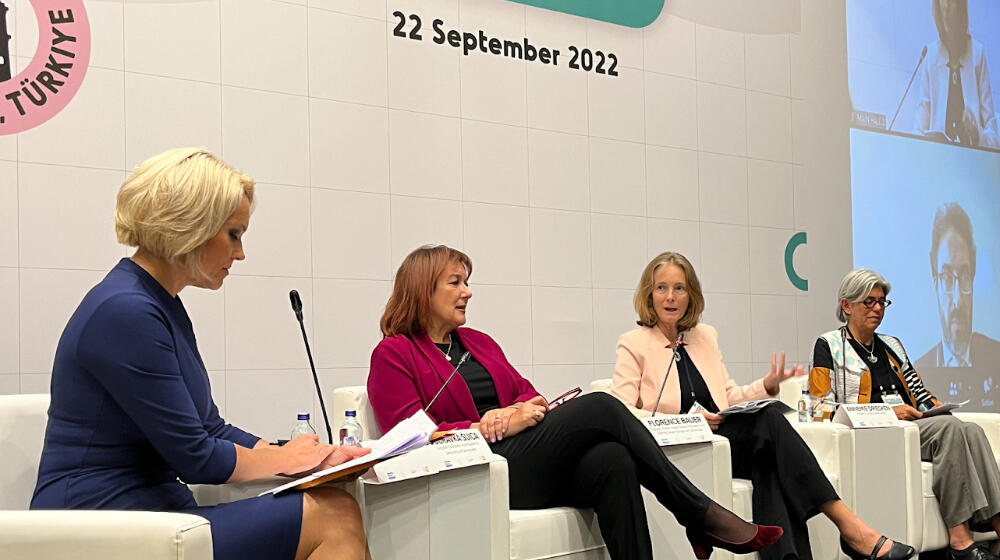“It’s time to tear down the barriers that prevent women and men to have the careers, and number of children, they want,” Florence Bauer, Director of UNFPA’s Regional Office for Eastern Europe and Central Asia, said at the opening of a high-level conference on family policies in Istanbul in September.
Over 100 government and business leaders from across Eastern Europe and Central Asia participated in the conference organized by UNFPA and held under UNFPA’s Expanding Choices programme, funded by the Austrian Development Cooperation (ADC). Participants stressed that both governments and the private sector can play a role in instituting family policies.
“If we're serious about supporting families, it is essential that we create an environment in which all kinds of families can thrive, no matter their composition,” said Dubravka Suica, European Commission Vice President and Commissioner for Demography and Democracy.
According to ILO data, in Eastern Europe, the share of women in the workforce is low, generally below 50 per cent. Those who do enter and remain in the workforce often find it difficult to start a family. In many cases, women end up with fewer children than they would have wanted.
Family policies include well-paid parental leave for women and men, care allowances, and anti-discrimination legislation protecting pregnant employees, as well as flextime work arrangements for employees, dedicated spaces at the workplace for lactating employees, and care facilities for children.
“What works in terms of family policies based on the evidence we have? A holistic mix of policies that are stable over time. Because having children and becoming parents is forever,” said Prof. Francesco Billari of Bocconi University, Milan.
Evidence shows that such policies – both at the national level and those implemented by the private sector – are powerful tools to shift discriminatory gender norms. When men take on more unpaid care work, it is easier for women to realize their career aspirations and their fertility intentions.
Businesses also benefit when family policies are introduced into the workplace as staff morale increases and there are lower levels of absenteeism, turnover, and recruitment costs, resulting in greater productivity and revenue.
For example, in Moldova, the Government, the private sector and external partners joined their efforts to assist women and men to have their desired number of children and achieve their career and personal aspirations. This assistance has encouraged several companies to change the way they treat their workers. For example, the Panilino bakery in Chișinău, set up a play and leisure area for the young children, supervised by someone employed by the company, thus allowing parents to more easily return to work after parental leave.
Some participants discussed the need to look beyond workplace policies and change how the burden of caring and housework is shared in the home.
“If we move towards more shared care at home and close the gender care gap, the gender pay and pension gaps will be solved, too,” said Annemie Drieskens, the President of the Confederation of Family Organisations in the European Union (COFACE).
In Albania, evidence from a national survey revealed that more needs to be done to implement policies that help families and carers. Policies to support working parents and carers are in place in Albania, but their implementation is limited, often due to a lack of awareness.
Under the Expanding Choices programme, UNFPA, with support from the Austrian Development Agency, partners with the private sector and governments to champion gender-responsive family policies in the Western Balkans and Moldova.
Family policies can help people have the number of children they want, and make it easier for women to join the workforce – both are desirable from an individual human rights perspective, and also because it helps countries mitigate the effects of demographic change, said Ms. Bauer. “But for family policies to have this effect, they must respond to the needs of women and take into account the diversity of modern families.”


